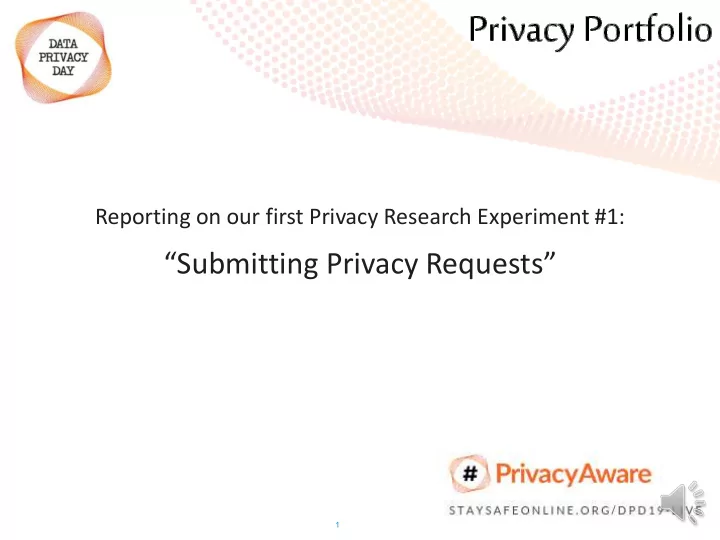

Reporting on our first Privacy Research Experiment #1: “Submitting Privacy Requests” 1
Introductions Your Host: Craig Erickson, CISSP CISA Data Protection Officer at PrivacyPortfolio Craig Erickson has worked in cybersecurity for multiple firms as an Analyst, Engineer and IT Auditor for 8 years in Puget Sound and the San Francisco Bay Area. Craig specializes in Data Governance, leveraging over 20 years of experience as a business process and systems integration expert. 2
Introducing PrivacyPortfolio XD* Metadata (document entry) Confidentiality Code The proposed model relies on personal Healthcare Facility Code data stored in a secure repository, Obligation Code under the control of individual data CDA Document subject who has an undisputed claim Confidentiality Code of ownership over their data assets. Document Type Refrain Code An API is needed to provide a common CDA Section interface to these repositories. Confidentiality Code The goal is to automate services that CDA Entry Obligation Code supports privacy transactions between Refrain Code entities and individuals. 3
Agenda 10:00 Introductions 10:05 The Problem and Why We Should Care 10:10 Experiment #1 Methodology 10:15 Experiment #1 Results 10:25 Key Challenges, Issues & Concerns 10:35 Improvements 10:40 Q&A - Discussion 4
5
What happens when we ask a question, express a concern, or lodge a complaint? Who has the right to do so? Why should we care about submitting privacy requests? 6
7
Notice. Consumers should be given notice of an entity’s information practices before personal information is collected from them. Without notice, a consumer cannot make an informed decision as to whether and to what extent to disclose personal information. Choice. …means giving c onsumers options... Access. …an individual’s ability both to access personal data an entity possesses AND to contest the accuracy and completeness of personal data… Security. …safeguards against unauthorized access, destruction, use or disclosure… Enforcement. …core principles of privacy protection can only be effective if there is a mechanism in place to enforce them… 8
Let’s try to make an informed decision as to whether and to what extent we choose to disclose personal information. Can we access our data? Are we able to enforce the security safeguards that protect our privacy? What are our options ... LET’S GO MYSTERY SHOPPING! 9
10
https://ncsa.wetransfer.com/downloads/ 11
12
Organizations spend a lot of resources on privacy practices Many privacy practices add a lot of undesirable burdens Some privacy practices offer very little value to all stakeholders When any security or compliance requirement has little or no value, other requirements also tend to suffer under the same perception whether that is applicable or not 13
Experiment #1: Methodology Discover how effective organizations are in responding to Privacy Goals Requests and Concerns from Data Subjects, and explore how can this information be used to improve privacy practices. How much effort(cost) is involved in resolving privacy requests? Questions How useful are the responses for data subjects? What issues and concerns arise in responding to requests? • % of organizations responding to Privacy Requests and Concerns Metrics • Time elapsed from start-to-finish • Relevancy scores of responses provided 14
Experiment #1: Methodology Sample 100 organizations with published privacy policies Skew sample with SMEs in privacy, security, and compliance (47) Exclude organizations without email contact info – no web forms Half receive this Privacy Question (email subject line): "How and when will I be notified if there is a data breach?" Half receive this Privacy Concern (email subject line): "I'm concerned about how and when I'll be notified of a data breach" * Designed to test if concerns are handled differently than questions 15
Experiment #1: Results 10% Undeliverable 16% No response after 2 attempts within 17 days 13% Acknowledged but not answered within 15 days ----- 39% of all requests are not answered 40% Answers 01% Error 02% Disqualified 07% Boilerplate FAQs 13% Additional Questions ------ 102% Total Sample 16
Experiment #1: Results Who responds? Relevance Scores – Highly relevant 8 unknown Usefulness Scores – Fairly useful 19 privacy 1 contracts Effort Scores – Mostly low 10 support 2 exec 40 Who responds better? Team Relevance Usefulness Effort support 3 3 1 privacy 2 1 1 17
Experiment #1: Results Most Frequent Responses: 22 general when and how 5 general when, specific how 6 specific when and how 0 specific when, general how https://github.com/PrivacyPortfolio/Experiments/ 18
Key Challenges Who are you? What is your relationship with us? What is your question or concern? Requirements to use web forms and account portals Translating legal and policy language for end-users (lay people) 19
Issues & Concerns Role Context Issues Security Concerns Unqualified Respondents Ethical Concerns Notification Protocols 20
Improving Privacy Practices 1. Revise our Policy to avoid specifying rights and contacts specific to role contexts of data subjects. 2. Modify our Privacy Request Templates to clearly state the role, relationship, and right to submit a request by or on behalf of the data subject. 3. Adopt a new policy rule that communication exchanges must not rely on data entry in online web forms or notices posted on websites. 4. The only valid responses are documented in writing and signed by a real person with title or appropriate group alias such as privacy, security, compliance. 21
Q & A / Open Discussion
Recommend
More recommend